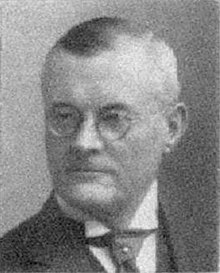Carl Gottfried Gok
Carl Gottfried Gok (born November 1, 1869 in Altshausen ; † August 11, 1945 in Hamburg-Sankt Pauli ) was a German businessman and politician (DNVP). Gok was a member of the Reichstag from 1924 to 1930 and from 1932 to 1936 .
Live and act
Carl Gottfried Gok attended elementary school and then the Latin school in Göppingen. He then attended theological seminars in Schöntal and Urach and the Karls-Gymnasium in Stuttgart . From 1888 he belonged to the King Karl Grenadier Regiment No. 123 in Ulm. In 1890 he was promoted to second lieutenant, in December 1891 he was transferred to the reserve. Further stationing followed, most recently in 1892 as a Prussian captain of Land Infantry Regiment I. In 1896 he became a helmsman, in 1899 he acquired the ship's exam at the navigation school in Lübeck . From 1896 to 1911 Gok was active in the service of the Hamburg-America Line. From 1908 he worked in East Asia as an inspector and as head of the Tsingtau and Hong Kong branches .
From July 1911 to 1933 - interrupted from 1914 to 1918 by his participation in the First World War - he worked for the Hamburg shipyard Blohm & Voss , where he finally made it to general director. Since 1921 he was also an assessor at the Hamburg Trade Court and a member of the board of the Association of German Iron and Steel Industrialists . In 1927 he became a labor judge.
As a businessman, Gok was considered to be one of the best networked men in German business. He attracted public attention mainly because of his opposition to the trade unions. In 1930 Gok received an honorary doctorate from the University of Tübingen ( Dr. rer. Pol. Eh ).
Apart from his work as a shipowner, Gok was involved in the German National People's Party (DNVP), for which he was a member of the Reichstag from 1924. As the most important supporter of Alfred Hugenberg in the Hamburg regional association of the DNVP, Gok played a decisive role in the assertion of Hugenberg as the new chairman of the party in 1928. In 1931 he took part in the Harzburg Front . Gok was also a supporter of a war against the Soviet Union , so he announced publicly at the Halberstadt Association Day of the Pan-German Association in 1927:
- “A monarchical Germany is the only power in today's world that can create true order in Russia and thus restore true peace to the world. There is no lack of indications that this realization is beginning to dawn on the discerning also in the Anglo-Saxon countries. "
After Carl Gottfried Gok 1924-1930 as a member of his party for the constituency 34 (Hamburg-Altona) the Reichstag had heard, he retired at the September 1930 elections out of the Parliament. In 1932 he was finally able to return to the Reichstag. Since the dissolution of the DNVP and all other parties in Germany with the exception of the NSDAP in the summer of 1933, Gok was a member of the parliament - now deprived of all power - as a guest of the NSDAP parliamentary group until 1936. On March 29, 1936, he ran again in the Reichstag election, but was not elected this time.
From 1933 to 1945 he held managerial positions for the Pomeranian Lime Works and the Stones and Earth Association. From 1940 to 1945 he was appointed head of the production department in the Department of Agriculture.
Gok's estate is now stored in the Koblenz Federal Archives . The estate is marked as NL 34, contains materials from the years 1914 to 1937 and comprises 0.25 linear meters of shelf. The estate includes fragments of Gok's unpublished memoirs, speeches and publications and some documents relating to his professional activity as a shipyard director.
Fonts
- Carl Gottfried Gok: Speech at the Pan-German Association Day 1934 . In: Hans Adolf Jacobsen and Werner Jochmann: Selected documents on the history of NS , Bd. 1, Bielefeld 1960.
Web links
- Carl Gottfried Gok in the database of members of the Reichstag
- Carl Gottfried Gok in the online version of the Reich Chancellery Files Edition . Weimar Republic
Individual evidence
- ^ Biographical data according to Martin Schumacher, Katharina Lübbe and Wilhelm Heinz Schröder : The Reichstag members of the Weimar Republic . 1991, p. 241.
- ↑ Zeitschrift für Geschichtswwissenschaft, 1964, p. 831.
- ^ Otto Büsch, Wilhelm Treu and David E. Barclay: History as a task. Festschrift for Otto Büsch on his 60th birthday . 1988, p. 669.
- ↑ Ursula Büttner and Werner Jochmann : Hamburg on the way to the Third Reich. Development years 1931–1933 . 1985, p. 65.
- ↑ Andreas Meyhoff: Blohm & Voss in the Third Reich . Hamburg 2001, p. 47
- ↑ Jürgen Kuczynski : Studies on the history of German imperialism . Berlin 1950, Volume 2, p. 47
- ^ Friedrich Facius, Gerhard Granier and Josef Henke: The Federal Archives and its holdings . P. 54.
| personal data | |
|---|---|
| SURNAME | Gok, Carl Gottfried |
| BRIEF DESCRIPTION | German businessman, politician (DNVP), MdR |
| DATE OF BIRTH | November 1, 1869 |
| PLACE OF BIRTH | Altshausen |
| DATE OF DEATH | August 11, 1945 |
| Place of death | Hamburg-Sankt Pauli |
